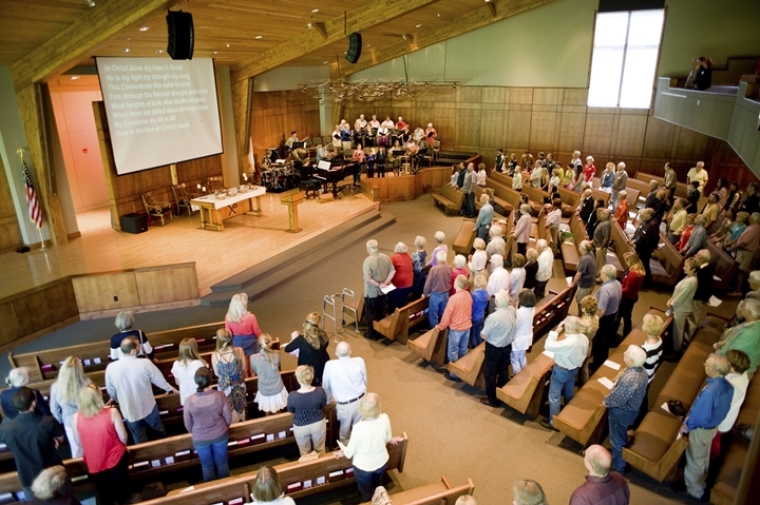U.S. Christian Population Declines While More Adults Say They've No Religion, Survey Shows

The number of Christians in the U.S. is declining while the number of adults without any identified organized religion is increasing, a recent survey by Pew Research Center showed.
It said the survey of 35,000 Americans revealed that the decrease in Christian affiliation "is occurring among Americans of all ages."
"The same trends are seen among whites, blacks and Latinos; among both college graduates and adults with only a high school education; and among women as well as men," the survey said.
The center said the U.S. remains the biggest country in the world for Christians with 7 in 10 Americans identifying themselves as Christians.
Among the 35,000 people surveyed, the percentage of adults age 18 and older who identify themselves as Christians dropped from 78.4 percent in 2007 to 70.6 percent in 2014, a drop of 8 percentage points.
On the other hand, the number of Americans who don't have religious affiliation, describing themselves as atheist, agnostic or "nothing in particular," jumped from 16.1 percent in 2007 to 22.8 in 2014.
Those who identify with non-Christian faiths increased from 4.7 percent to 5.9 percent in the same period.
"Growth has been especially great among Muslims and Hindus, albeit from a very low base, the Center said.
Among Christians, the number of Protestants declined from 51.3 percent to 46.5 percent while the number of Catholics also decreased from 23.9 percent to 20.8 percent.
Mormons decreased from 1.7 percent to 1.6 percent while Orthodox Christians also declined from 0.6 percent to 0.5 percent.
"The drop in the Christian share of the population has been driven mainly by declines among mainline Protestants and Catholics," the Center said.
It noted that American Christians are becoming more racially and ethnically diverse.
"Non-Hispanic whites now account for smaller shares of evangelical Protestants, mainline Protestants and Catholics than they did seven years earlier, while Hispanics have grown as a share of all three religious groups. Racial and ethnic minorities now make up 41 percent of Catholics (up from 35 percent in 2007), 24 percent of evangelical Protestants (up from 19 percent) and 14 percent of mainline Protestants (up from 9 percent)," the Center revealed.
 Christians don't have to affirm transgenderism, but they can’t express that view at work: tribunal
Christians don't have to affirm transgenderism, but they can’t express that view at work: tribunal Archaeology discovery: Medieval Christian prayer beads found on Holy Island
Archaeology discovery: Medieval Christian prayer beads found on Holy Island Presbyterian Church in America votes to leave National Association of Evangelicals
Presbyterian Church in America votes to leave National Association of Evangelicals Over 50 killed in 'vile and satanic' attack at Nigerian church on Pentecost Sunday
Over 50 killed in 'vile and satanic' attack at Nigerian church on Pentecost Sunday Ukrainian Orthodox Church severs ties with Moscow over Patriarch Kirill's support for Putin's war
Ukrainian Orthodox Church severs ties with Moscow over Patriarch Kirill's support for Putin's war Islamic State kills 20 Nigerian Christians as revenge for US airstrike
Islamic State kills 20 Nigerian Christians as revenge for US airstrike Man who served 33 years in prison for murder leads inmates to Christ
Man who served 33 years in prison for murder leads inmates to Christ


 Nigerian student beaten to death, body burned over ‘blasphemous’ WhatsApp message
Nigerian student beaten to death, body burned over ‘blasphemous’ WhatsApp message 'A new low': World reacts after Hong Kong arrests 90-year-old Cardinal Joseph Zen
'A new low': World reacts after Hong Kong arrests 90-year-old Cardinal Joseph Zen Iran sentences Christian man to 10 years in prison for hosting house church worship gathering
Iran sentences Christian man to 10 years in prison for hosting house church worship gathering French Guyana: Pastor shot dead, church set on fire after meeting delegation of Evangelicals
French Guyana: Pastor shot dead, church set on fire after meeting delegation of Evangelicals ‘Talking Jesus’ report finds only 6% of UK adults identify as practicing Christians
‘Talking Jesus’ report finds only 6% of UK adults identify as practicing Christians Mission Eurasia ministry center blown up in Ukraine, hundreds of Bibles destroyed: 'God will provide'
Mission Eurasia ministry center blown up in Ukraine, hundreds of Bibles destroyed: 'God will provide' Church holds service for first time after ISIS desecrated it 8 years ago
Church holds service for first time after ISIS desecrated it 8 years ago Burger King apologizes for 'offensive campaign' using Jesus' words at the Last Supper
Burger King apologizes for 'offensive campaign' using Jesus' words at the Last Supper Uganda: Muslims abduct teacher, burn him inside mosque for praying in Christ’s name
Uganda: Muslims abduct teacher, burn him inside mosque for praying in Christ’s name